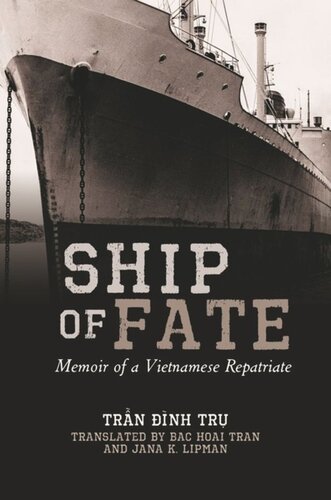

Most ebook files are in PDF format, so you can easily read them using various software such as Foxit Reader or directly on the Google Chrome browser.
Some ebook files are released by publishers in other formats such as .awz, .mobi, .epub, .fb2, etc. You may need to install specific software to read these formats on mobile/PC, such as Calibre.
Please read the tutorial at this link: https://ebookbell.com/faq
We offer FREE conversion to the popular formats you request; however, this may take some time. Therefore, right after payment, please email us, and we will try to provide the service as quickly as possible.
For some exceptional file formats or broken links (if any), please refrain from opening any disputes. Instead, email us first, and we will try to assist within a maximum of 6 hours.
EbookBell Team

4.7
106 reviewsShip of Fate tells the emotionally gripping story of a Vietnamese military officer who evacuated from Saigon in 1975 but made the dramatic decision to return to Vietnam for his wife and children, rather than resettle in the United States without them. Written in Vietnamese in the years just after 1991, when he and his family finally immigrated to the United States, Trần Đình Trụ’s memoir provides a detailed and searing account of his individual trauma as a refugee in limbo, and then as a prisoner in the Vietnamese reeducation camps.
In April 1975, more than 120,000 Indochinese refugees sought and soon gained resettlement in the United States. While waiting in the Guam refugee camps, however, approximately 1,500 Vietnamese men and women insisted in no uncertain terms on being repatriated back to Vietnam. Trụ was one of these repatriates.
To resolve the escalating crisis, the U.S. government granted the Vietnamese a large ship, the Việt Nam Thương Tín. An experienced naval commander, Trụ became the captain of the ship and sailed the repatriates back to Vietnam in October 1975. On return, Trụ was imprisoned and underwent forced labor for more than twelve years.
Trụ’s account reveals a hidden history of refugee camps on Guam, internal divisions among Vietnamese refugees, political disputes between the United Nations High Commissioner for Refugees and the U.S. government, and the horror of the postwar “reeducation” camps. While there are countless books on the U.S. war in Vietnam, there are still relatively few in English that narrate the war from a Vietnamese perspective. This translation adds new and unexpected dimensions to the U.S. military’s final withdrawal from Vietnam.